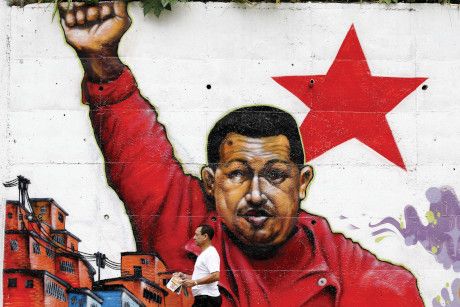What we think
You are here
Canada fuels crisis in Venezuela

February 3, 2019
The government of Canada has announced its support for the Venezuelan opposition leader Juan Guaidó, essentially green-lighting a coup to oust the elected president Nicolas Maduro. They blame the humanitarian crisis in the country on the left wing politics of Maduro –the heir to the highly popular socialist president Hugo Chavez.The reality is that this is another example of Canada and the US pushing for regime change, not because of a humanitarian situation but as a means of opening the country up to pillage by “our” corporations.
US in Latin America
The US has always considered Latin America as part of its natural sphere of influence. They have attacked any leader from Chavez to Salvador Allende in Chile if they dare to challenge US control. They have invaded, launched economic warfare and funded death squads in Nicaragua, Honduras, Columbia, Haiti, Cuba, Dominican republic and many more. There have been 56 military incursions by US supported forces in the region since the turn of the 20th century.
US Marine Corps General Smedley Butler, who was involved in a dozen US invasions of Latin America said it clearly: “I spent most of my time being a high class muscle-man for Big Business, for Wall Street and for the Bankers. In short, I was a racketeer, a gangster for capitalism.”
In the case of Venezuela, the US has wanted to oust the Chavistas since they came to power. After an unsuccessful CIA led coup attempt in 2002, they instead engaged in economic warfare using the former Venezuelan ruling class as proxies.
The Bolivarian Revolution
The Bolivarian revolution, as Chavez’s version of socialism was called, did result in significant changes with increased spending on programs for the poor and displaced. All of this was paid for by oil wealth, Venezuela having the second largest reserves in the world after Saudi Arabia.
And there were some improvements for working people. Under Chavez, poverty fell from 70.8% in 1996 to 21% in 2010. The number of people going hungry fell from 21% to 5% in the same period. Local governance structures allowed for more democratic participation in the politics of the country, crime rates fell, even in notoriously dangerous Caracas, and working people felt they had a champion in Chavez.
The revolution was an attempt to get out from under the boot of the imperial interests which had pillaged the continent for centuries.
There were still, however, persistent problems with the process. Centrally, the revolution didn’t go far enough. Most sectors of the economy remained in the hands of the capitalists. Food production and distribution for example, controlled by a tiny elite, was used over and over again as a means of building discontent as the companies manipulated food distribution.
The mass media, with the exception of a few networks, also remained in the hands of the rich. During the coup attempt in 2002, they all suspended regular programming to call for Venezuelans to join the coup. There were also multiple bosses’ strikes, where workers would be locked out and sectors of the economy would stagnate.
To make matters worse, corruption increased within the government. There are many reasons for this, from foreign meddling to lack of proper and binding oversight – but it did lessen the enthusiasm of supporters of the revolution. Chavez remained personally popular, but that was insufficient. No revolution can survive based on a cult of personality alone. After Chavez died in 2013, the right wing opposition saw its prospects increase greatly.
The crisis
The economy of Venezuela has been in significant crisis since the collapse of oil prices at the end of 2015 but that crisis has been massively exacerbated by the US sanctions that came into effect in August 2017.
The impact has been enormous. The sanctions essentially banned any investment from US-based companies or individuals in the Venezuelan oil industry. As investment dried up, production decreased. That, coupled with the collapsing price of oil, has been devastating. The government has been printing money to try and pay off its debts, resulting in hyper-inflation.
There is no longer any money for food and medicine, and people are going without essential needs. The opposition to Chavez, which is based in the upper and middle classes, seized the initiative and renewed their campaigns of sabotage of the government. The result has been chaos.
And now there is new enthusiasm from the global elite to get rid of the whole revolutionary project.
Already Guaidó has announced that he will open up the country’s oil supplies to foreign investment and will look to the IMF to lend money to stabilize the economy, thus ensuring austerity in the form of structural adjustment programs, a prerequisite to getting IMF funds.
Revolutionary response
There are many problems with the Maduro government and Chavez’s project – but it was an attempt by a country to try a different model of development than the one imposed by the imperialists. For that reason, it still has millions of supporters inside the country. They will have to mobilize and organize to head off this threat.
But it will be difficult. There is a lesson here for revolutionaries who look for a way to build socialism while leaving the ruling class in their position of economic power. As the old saying goes, “Those who make revolution half way only dig their own graves”.
But make no mistake. What we are seeing is the imperial powers punishing Venezuela and lining up at the trough to gorge on the country’s resources. Whatever violence accompanies the next stages of this process is the fault of Trudeau, Freeland, and Trump. The job of socialists is to stand in solidarity with the Venezuelan people against any imperial meddling.
Section:










